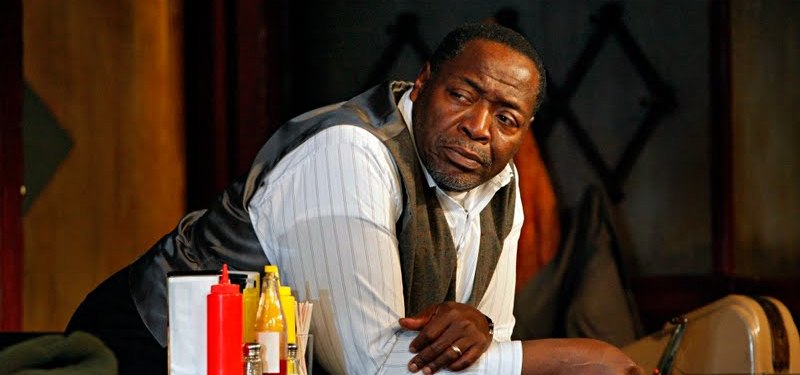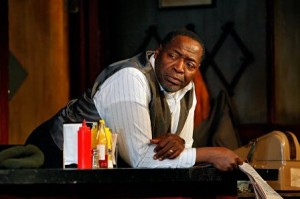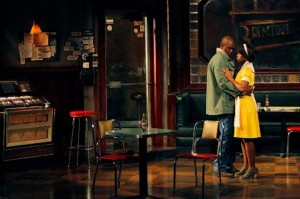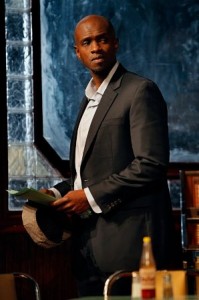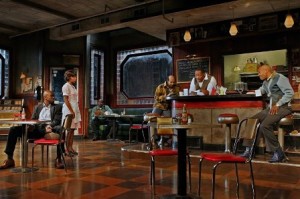
Members of the Company in TWO TRAINS RUNNING at Two River Theater Company in Red Bank, NJ. (Photo by Michal Daniel)
We may know August Wilson as a playwright and not a bluesman, but if ever the two arts can coverage in an ideal synchronicity, it is in the work of Mr. Wilson. I do not mean that he was a master at integrating music into his plays, which is true enough. But more specifically, Wilson saturated his plays in the aesthetic of the blues, the lyrical and musical expression of wrestling with hope and despair in an uncertain attempt to navigate a harsh world. “You don’t sing to feel better,” says Wilson’s Ma Rainey, “You sing ’cause that’s a way of understanding life.”
With a powerfully soulful production of TWO TRAINS RUNNING, Two River Theater Company has brought Mr. Wilson’s blues back to Red Bank, and with Ruben Santiago-Hudson back at the helm of his stellar cast of regulars, this show fully embraces Wilson’s blues aesthetic in its attempt to understand African-American life in the 1960s. The play is less a chronicle or mimesis of the era of its setting than it is an exploration and expression of the pain, angst, and spirituality pervading its characters and their community.
TWO TRAINS RUNNING, that is, takes the form of a dramatic rendition of the blues, each of its characters a verse, and their collective a chorus of desire, despair, and the search for a voice.
The action of the play takes place entirely within the cramped confines of a corner diner (gorgeously designed and appointed by Michael Carnahan) owned by Memphis (Chuck Cooper) in Pittsburgh’s Hill District. Run by Memphis and his waitress/cook/janitor/everything else Risa (Roslyn Ruff), the diner is a hub for a disparate group of locals, including the numbers-runner Wolf (John Earl Jelks), Sterling (Owiso Odera) who has just been released from prison, the resident spiritual philosopher Holloway (James A. Williams), the affluent undertaker West (Harvy Blanks), and a local vagrant Hambone (Anthony Chisholm) who shows up regularly for the meager bowl of beans Risa provides him.
The storylines of each intersect and diverge like train tracks at a station: Sterling pursues Risa who catches flak from Memphis who grows angry with Wolf for taking bets at the diner where Holloway bemoans the black community’s urge for chasing money that’s going to end up in the pocket of the white man anyway, leaving them only with death and burial by West. The characters come and go regularly from Memphis’s diner (including the proprietor, who has business with the city who wants to buy his building to tear it down) as the play concerns itself primarily with the brief moments in which lives share space and nascent if fleeting community.
It would be inaccurate to say that any of these characters are overly bound up with any of the others, but it would equally be a mistake to suggest that this is a collection of loners. That they congregate in fits and starts at a short-order restaurant is wholly appropriate of these characters: all are on individual journeys that are advanced and complicated by small doses of community.
In the uniformly excellent ensemble of this blues chorus, the verses of Ruff’s Risa and Chisholm’s Hambone manage to emerge as particularly soulful performances. A beautiful young woman who has purposely slashed and scarred her own legs (“in an attempt to define herself in terms other than her genitalia” explains the script’s scene direction), Risa engages only haltingly with the community of men around her. As the men’s speeches buzz with the frenetic rhythms of jazz, Ruff’s are as slow and meandering as her gait around stage. Risa’s blues are of the deeply painful variety, and Ruff’s embodiment of that pain is a persistent on-stage check on any sentimental notions of healing and happiness.
Much the same is true of Hambone: that a performer as accomplished and skilled as Anthony Chisholm would commit himself to little more than two repeated lines of dialogue underscores the depth and complexity of this easily overlooked character. Hambone is consumed with anger and bewilderment, and he can express that only with “I want my ham!” and “He gonna give me my ham!,” but in this constant refrain Chisholm finds space for a remarkable range of pain and desire, skillfully allowing Hambone to become an important central figure in this community, at once unifying and divisive.
Among the most recognizable characteristics of the blues is the practice of repeating with a difference (“Early this morning/ When you knocked upon my door/ Early this morning, ooo/ When you knocked upon my door,” goes Robert Johnson’s “Me and the Devil Blues”), and so it is fitting that Two River and Santiago-Hudson reprise last season’s production of August Wilson’s JITNEY with TWO TRAINS RUNNING, a play in which the author actively repeats many of the themes and characters of JITNEY with a difference (JITNEY premiered in 1982, set in the 1970s; TWO TRAINS premiered in 1990, set in the 1960s). In Cooper’s Memphis, audiences will recognize a variant of his Becker; with Holloway, Williams revisits and resignifies JITNEY’s Daub; Odera’s zealous Sterling recalls the enterprising Youngblood (Brandon J. Dirden in JITNEY); Ruff restages the long-suffering female character, this time with very different desires and drives.
Most pointedly, we see here again the tenuous community constantly uniting and diverging (be the metaphor trains at a station or jitneys at a cab stand), and begin to recognize more fully Wilson’s picture of the twentieth-century African-American experience. His blues are unromantic and unsentimental, and so while they constantly bring communities together, they do little to galvanize those communities fully or assuage their pains. That he leaves to the characters who, like Ma Rainey, express their own blues in the imperfect hope of understanding life.
TWO TRAINS RUNNING
by August Wilson
Directed by Ruben Santiago-Hudson
February 2 – March 3, 2013
Two River Theater Company
21 Bridge Avenue
Red Bank NJ, 07701
732-345-1400
http://www.trtc.org/

